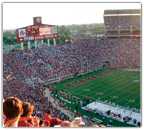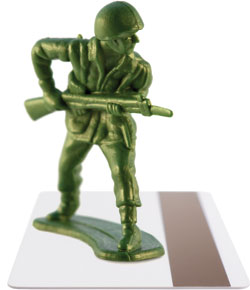Blackboard enables Crimson Tide to distribute student football tickets online
By Andy Williams, Associate Editor
 Distributing football tickets equitably to students has often been an exercise in frustration, particularly if there aren’t enough tickets to go around at schools where football reigns supreme or when football teams consistently have winning records. Both scenarios are true for one of the Southeastern Conference’s powerhouses, the University of Alabama in Tuscaloosa.
Distributing football tickets equitably to students has often been an exercise in frustration, particularly if there aren’t enough tickets to go around at schools where football reigns supreme or when football teams consistently have winning records. Both scenarios are true for one of the Southeastern Conference’s powerhouses, the University of Alabama in Tuscaloosa.
But the ticketing process became far easier for both students and university personnel last fall when the campus rolled out a new program called “My Football Ticket.” Simply put, the new solution enables students to manage their football ticket account online. Actually, “ticket” in this case is a misnomer because a physical ticket is no longer required for entry to the games.
Since Paul “Bear” Bryant made football an institution when he began coaching there 50 years ago, Alabama has never had trouble selling out the stadium. But for students that has meant long lines. And when you have a team that went undefeated during the regular 2008 season and was ranked Number One for the last several weeks of the season, the ticket problem is compounded.
This popularity led to the new innovation. The idea for My Football Ticket originated in the Student Government Association, says Jeanine Brooks, director of the University’s Action Card. Previously, she explains, students bought their reduced fee ticket packages, but they still needed a physical ticket and their ID card swiped to enter the stadium because only students were allowed to use a student ticket.
“The SGA wanted a more efficient way to get students in the stadium and they preferred not to have to deal with paper tickets,” she says.
After the idea first surfaced, university officials met to decide how to implement it. “We looked at developing an in-house system, but then decided the Web site was better,” says Susan Hunter, director of Enterprise Development and Application Support at the university’s Office of Technology Information.
“Students are used to going to our site to check their balances and transactions. We just had to add another tab. Blackboard developed that piece because it was a custom application. Students are looking for self service, 365 days a year, 24/7,” says Hunter. The university requested the program in February 2008 and had it back in June.
“The university came to us in early summer,” recalls Dan Gretz, senior marketing director for Blackboard, which services some 450 colleges, including the University of Alabama. “We thought it was an interesting case, because it’s really a good example of how schools are using Blackboard’s existing technology.”
“I was absolutely amazed at how the students adapted,” says Brooks. “I thought our office would be swamped with questions, but we opened the system up and still went home at 5 o’clock. But it took lot of work behind the scenes.”
The most visible addition was the new tab on the school’s Web interface. “The front-end required some customization but the back-end works with existing technology,” Brooks says.
The back-end involves assignment of privileges. “Within our software, schools are able to assign certain privileges to a cardholder’s account. A privilege can be a meal plan or access to a building,” says Gretz. “In terms of My Football Ticket, you have a privilege set for each game that you have a ticket for, and that grants you access to that game.”
Besides student convenience, there was another reason the school wanted a different way to manage the tickets. It all boiled down to numbers. The university enrollment has jumped from 19,000 to 27,000 in about five years. The stadium seats 91,000 fans and is sold out every game.
“We have 15,000 student seats for those 27,000 students,” says Brooks. “There has been some history of students selling tickets online for a higher price or selling whole ticket packs online at one of the auction sites.”
Even non-students could buy these tickets, then upgrade them for a regular admission ticket by paying the difference.
Now, with My Football Ticket, each spring the university announces to the students that football student ticket packages are for sale. “It’s first come, first serve,” says Brooks. “They go online and purchase student packages and the athletics department supplies this data to Action Card.”
After that, if the student intends to go to the game, he doesn’t have to do anything but show up and swipe his card. “Before we were having to tear a ticket and swipe the card. Readers are fast but we still have to examine the picture on the card,” says Brooks. “The new ticketless system has really expedited entrance to the game.”
It has also stopped non-students from attempting to use a student ticket at the gate, she adds.
Enabling ticket sharing or donating
Another feature the SGA wanted for students was the flexibility to make last minute decisions. For example, if a student decided they couldn’t go to the game, the ticket could be transferred to another eligible student.
The student has two ways to do it. He can assign his ticket to another eligible student or he can donate it, which the university encourages by offering prizes such as $100 scholarships, tickets to bowl games or Bama Cash that are awarded based on a random drawing.
Students who don’t have tickets apply to be on a wait list, which opens at 6 a.m. the Sunday following a game. The donated tickets are assigned, again on a first come basis, and students are issued an email receipt. If students fail to check their email to see if they’ve won the ticket, they lose it. Since the university has no way of knowing this, the seat could go empty, “but we have not really seen this,” says Brooks.
A student transfers his ticket to another student by giving his first name, last name and email address. No numbers are exchanged between students, says Brooks. However, there is one problem, she noted. Names have to match exactly. First letters of each name on the Action Card are capitalized. Thanks to the popularity of texting, many students have picked up some bad habits, even in their emails, and use all lower case letters.
Donated tickets started slowly but grew each game as word about this capability got around.
The hardest ticket to get is for the Crimson Tide’s annual battle with rival Auburn. Students who donated tickets for that game were eligible for the biggest prize, two tickets to the Sugar Bowl in Louisiana. “We had 598 donated tickets for that game,” says Brooks.
Last football season, students still had to swipe a reader to request a ticket to the SEC championship and bowl games. The university had 10,000 requests for between 1,200 and 1,300 tickets, says Brooks. “Next year, we would like to move the request reader swipe to an online request via My Football Ticket.”
As of mid-January there had been 130,063 hits at the My Football Ticket site, 14,677 transferred tickets and 3,677 eligible students who received a donated ticket after placing their name on the waiting list, says Brooks.
This new system probably won’t extend to other sports. The only one that might benefit is basketball, but it hasn’t been a problem yet, says Brooks. “At Other NCAA athletic events, you just swipe your card for admission.”
My Football Ticket has already received at least one honor. “We won the NACAS (National Association of College Auxiliary Services) Collaboration award because the system involved Action Card, SGA, the university’s IT department, student affairs, the athletics department and Blackboard. All had to work together to make this happen,” says Brooks.
While it’s only being done at Alabama now, “It is certainly a functionality that could be repeated elsewhere. We have had some interest from other schools,” says Gretz.
“This solution serves multiple needs,” he adds. “It’s primarily about operating more efficiently. Not having to issue paper tickets makes the whole process more cost effective.”
It also increases student service, Gretz notes. Schools are looking for these types of student services and the student feedback has been very positive.




